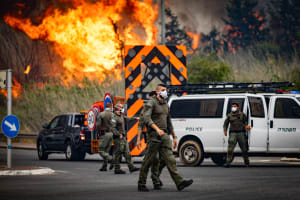Does new Hezbollah air defense system threaten Israeli aerial supremacy in Syria, Lebanon?
News comes as Israel reportedly struck weapons bound for Hezbollah: “Game-changing” weapons to Hezbollah, other Iranian proxies will not be tolerated, Israeli defense minister warns

Hezbollah, the Iranian-backed terrorist organization, is reportedly challenging the Israel Air Force’s near aerial supremacy in both Lebanon and Syria by deploying air defense systems in the Qalamoun Mountain region north of Damascus and in southern Lebanon, according to the Israel-based ALMA Research Center.
Hezbollah’s air defense arsenal is believed to include short- and medium-range Russian-made and Iranian-produced surface-to-air missile systems that could pose a serious challenge to Israeli Air Force military operations in Syria and Lebanon.
Tal Beeri, head of the research department at the ALMA Center, told The Jerusalem Post that Hezbollah’s air defense batteries could potentially threaten the Israel’s operations in the area. Beeri is particularly concerned with the potential presence of the Iranian Bavar-373 system, Tehran’s version of the advanced Russian SA-300 air defense system.
“It is possible that Hezbollah has trained on it and in all probability, we estimate that there have been attempts to transfer it to the group,” Beeri said.
The Iranian regime claims that its system is capable of targeting a wide variety of advanced military airplanes including stealth planes and drones.
Despite the new challenges, the Israeli military said it can maintain its aerial operational freedom in the Syrian and Lebanese skies.
Israel has largely refrained from taking sides in the Syrian Civil War. However, over the past eight years, the Jewish state’s air force has conducted hundreds of military operations in Syria, mainly against military targets affiliated with Iran and its terrorist proxy Hezbollah. The purpose of the Israeli military campaign in Syria – known as war-between wars – is to prevent the transfer of game-changing weapons to Hezbollah and undermining the Iranian regime’s efforts to threaten Israel by entrenching itself in neighboring Syria.
In the face of a provocative Syrian, Russian and Iranian military presence, as well as numerous militias, Israel has largely succeeded in maintaining its aerial supremacy against its Iranian and Hezbollah adversaries in Syria.
Israeli military officials have warned in recent months that Iran is intensifying its efforts to improve Syria’s and Lebanon’s air defenses in order to undermine Israel’s military operations in the area.
Israeli Defense Minister Benny Gantz warned the Iranian regime on Tuesday that the Jewish state would not tolerate the transfer of “game-changing” weapons to Hezbollah and other Iranian-supported terrorist proxies in Lebanon and Syria.
“I call on all countries of the region to stop Iran’s harm to their sovereignty and to their citizens. Israel will not allow Iran to stream game-changing weapons to its proxies and to threaten our citizens,” Gantz stated.
Gantz’s warning came shortly after Israel reportedly bombed an Iranian arms shipment in the Syrian port Latakia for the second time in recent weeks. While the Jewish state did not officially take responsibility for the attack, Syrian authorities said Israeli military planes were behind the strike, which reportedly caused massive explosions in the Syrian port.
Speaking at the Ramat David Airbase with F16 fighter jet squadrons in northern Israel, Gantz said the Israeli military forces were “completing a year of significant operational activity.”
The Israeli defense minister bluntly identified Iran as the main threat to Israel and the Middle East region.
“This year too we have acted against threats on various fronts, all of them fueled by Iran, which is the greatest enemy to my nation and to the residents of the Middle East,” Gantz said.
In early December, Israel reportedly targeted Iranian military targets in another strike in Latakia – an unusual move due to the fact that Russian military forces are located close to the strategically important Syrian port.
A tacit understanding exists between Russia and Israel that neither side interferes in each other’s national interests in Syria. Consequently, the Iranian ayatollah regime has taken advantage of the Russian-Israeli understanding by deliberately deploying some of its military assets adjacent to Russian positions in Syria.

The All Israel News Staff is a team of journalists in Israel.














